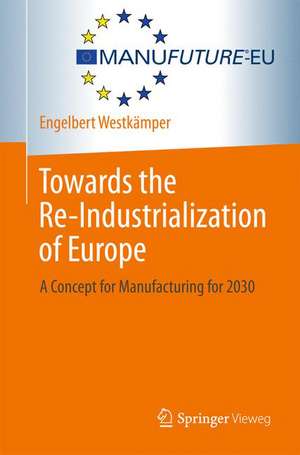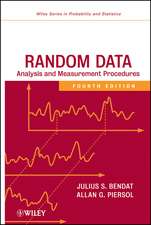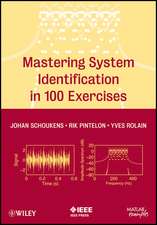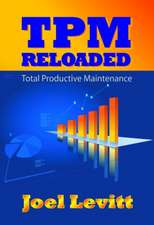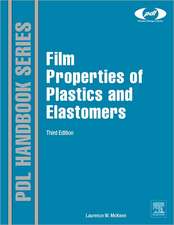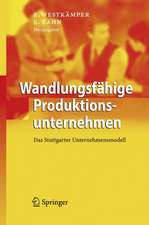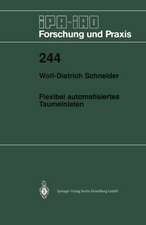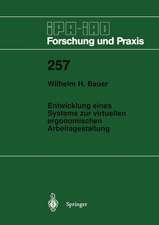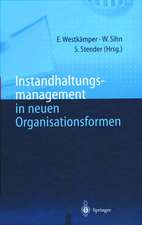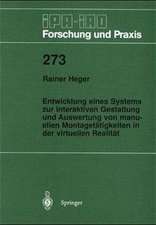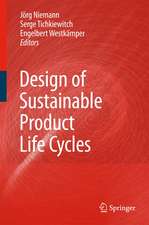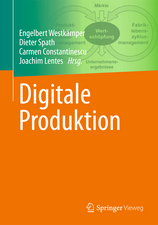Towards the Re-Industrialization of Europe: A Concept for Manufacturing for 2030
Autor Engelbert Westkämperen Limba Engleză Hardback – 16 aug 2013
This book is intended as a significant contribution to the on-going European discussions after the economic crisis and the economic problems in many regions. It is meant to enrich actual political dialogues for overcoming the crises by activating new potentials of high added value. As such, it seeks to provide the necessary orientation for enacting fundamental changes of business models and factory capabilities in order to meet the challenges of the global economy and minimizing environmental impacts. It also opens perspectives for enterprise strategies and for further research topics. Concrete recommendations are made for fields of action and future development towards achieving a sustainable industrial sector in Europe.
‘Towards the Re-Industrialization of Europe’ is based on megatrends, societal challenges and objectives for factories development. Focused on the realization of these goals by 2030, the treatise addresses four major topics of the European strategy in manufacturing: manufacturing in the urban environment; green manufacturing; manufacturing in the value chain, and manufacturing in the age of knowledge and communication. One enabler of this strategic orientation is the implementation of holistic manufacturing systems which reflect manufacturing as a social-technical system that has to be innovated, optimized and adapted to the future requirements by implementation of enabling technologies and human skill. The public infrastructure and reviving industries must also be able to support the strengthening of the economy through collaboration in research and education.
| Toate formatele și edițiile | Preț | Express |
|---|---|---|
| Paperback (1) | 632.37 lei 6-8 săpt. | |
| Springer Berlin, Heidelberg – 28 aug 2015 | 632.37 lei 6-8 săpt. | |
| Hardback (1) | 638.43 lei 6-8 săpt. | |
| Springer Berlin, Heidelberg – 16 aug 2013 | 638.43 lei 6-8 săpt. |
Preț: 638.43 lei
Preț vechi: 751.10 lei
-15% Nou
Puncte Express: 958
Preț estimativ în valută:
122.20€ • 132.78$ • 102.72£
122.20€ • 132.78$ • 102.72£
Carte tipărită la comandă
Livrare economică 21 aprilie-05 mai
Preluare comenzi: 021 569.72.76
Specificații
ISBN-13: 9783642385018
ISBN-10: 364238501X
Pagini: 120
Ilustrații: XII, 112 p.
Dimensiuni: 155 x 235 x 12 mm
Greutate: 0.36 kg
Ediția:2014
Editura: Springer Berlin, Heidelberg
Colecția Springer
Locul publicării:Berlin, Heidelberg, Germany
ISBN-10: 364238501X
Pagini: 120
Ilustrații: XII, 112 p.
Dimensiuni: 155 x 235 x 12 mm
Greutate: 0.36 kg
Ediția:2014
Editura: Springer Berlin, Heidelberg
Colecția Springer
Locul publicării:Berlin, Heidelberg, Germany
Public țintă
ResearchCuprins
ManuFuture – The European Technology Platform for Manufacturing.- Manufacturing - the Backbone of the European Economy.- Global Megatrends.- The Objectives of Manufacturing Development.- Visions of Future Manufacturing in Europe.- Fields of Research for Sustainable Growth.- Infrastructure for Efficient Manufacturing.- Education and Skill.- Global Manufacturing and Internationalization.- Conclusions.
Notă biografică
Professor Dr.-Ing. Prof. E.h. Dr.-Ing. E.h. Dr.h.c. (mult) Engelbert Westkämper, (1946) Germany. Westkämper studied Mechanical Engineering at the RWTH Aachen. After his Dr. degree he worked in leading positions from 1977 to 1987 in aircraft and in electronics industry with responsibilities for manufacturing technologies. From 1988 to 1995 he was appointed as Professor and Director of the Institute of Machine Tools and Manufacturing Technologies (IWF) at the University of Braunschweig. 1995 - 2011 he was head of the Institute of Industrial Manufacturing and Management (IFF) at the University Stuttgart and executive director of the Fraunhofer-Institute for Manufacturing Engineering and Automation (IPA) in Stuttgart, Germany. He is one of the founders and CEO of the Graduate School of Excellence for Advanced Manufacturing Engineering (GSaME) in Stuttgart. Westkämper was awarded by universities in Germany, Ukraina and Romania. He is Fellow of CIRP and ACATEC. He is one of the principal investigators and Member of the High Level Group of the EU Technology Platform Manufuture.
Textul de pe ultima copertă
Not only are European industries shrinking and experiencing diminishment of their capability to add value, but Europe has lost more than a third of its GDP, which had been primarily based on manufacturing, and it suffers the consequences in high unemployment and weakened states finance.
This book is intended as a significant contribution to the on-going European discussions after the economic crisis and the economic problems in many regions. It is meant to enrich actual political dialogues for overcoming the crises by activating new potentials of high added value. As such, it seeks to provide the necessary orientation for enacting fundamental changes of business models and factory capabilities in order to meet the challenges of the global economy and minimizing environmental impacts. It also opens perspectives for enterprise strategies and for further research topics. Concrete recommendations are made for fields of action and future development towards achieving a sustainable industrial sector in Europe.
‘Towards the Re-Industrialization of Europe’ is based on megatrends, societal challenges and objectives for factories development. Focused on the realization of these goals by 2030, the treatise addresses four major topics of the European strategy in manufacturing: manufacturing in the urban environment; green manufacturing; manufacturing in the value chain, and manufacturing in the age of knowledge and communication. One enabler of this strategic orientation is the implementation of holistic manufacturing systems which reflect manufacturing as a social-technical system that has to be innovated, optimized and adapted to the future requirements by implementation of enabling technologies and human skill. The public infrastructure and reviving industries must also be able to support the strengthening of the economy through collaboration in research and education.
This book is intended as a significant contribution to the on-going European discussions after the economic crisis and the economic problems in many regions. It is meant to enrich actual political dialogues for overcoming the crises by activating new potentials of high added value. As such, it seeks to provide the necessary orientation for enacting fundamental changes of business models and factory capabilities in order to meet the challenges of the global economy and minimizing environmental impacts. It also opens perspectives for enterprise strategies and for further research topics. Concrete recommendations are made for fields of action and future development towards achieving a sustainable industrial sector in Europe.
‘Towards the Re-Industrialization of Europe’ is based on megatrends, societal challenges and objectives for factories development. Focused on the realization of these goals by 2030, the treatise addresses four major topics of the European strategy in manufacturing: manufacturing in the urban environment; green manufacturing; manufacturing in the value chain, and manufacturing in the age of knowledge and communication. One enabler of this strategic orientation is the implementation of holistic manufacturing systems which reflect manufacturing as a social-technical system that has to be innovated, optimized and adapted to the future requirements by implementation of enabling technologies and human skill. The public infrastructure and reviving industries must also be able to support the strengthening of the economy through collaboration in research and education.
Caracteristici
Contribution to a highly relevant theme Written by an expert in the field
